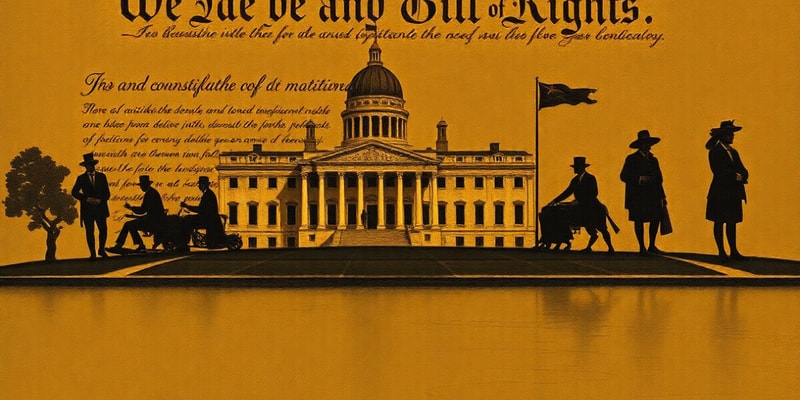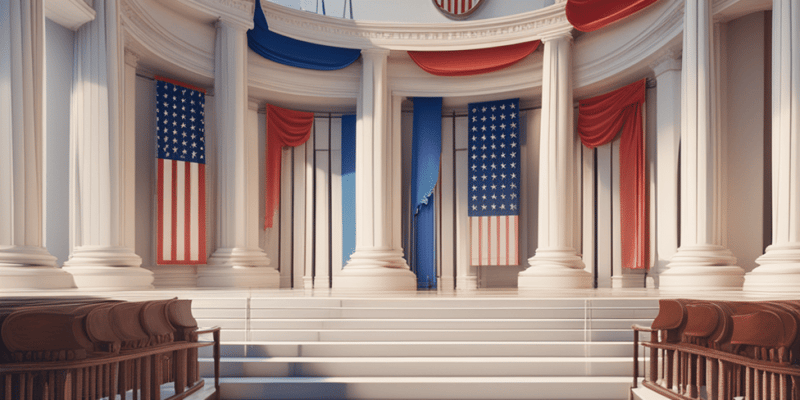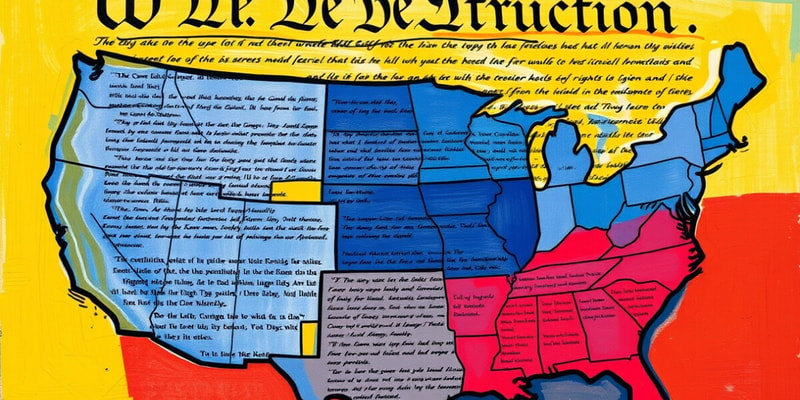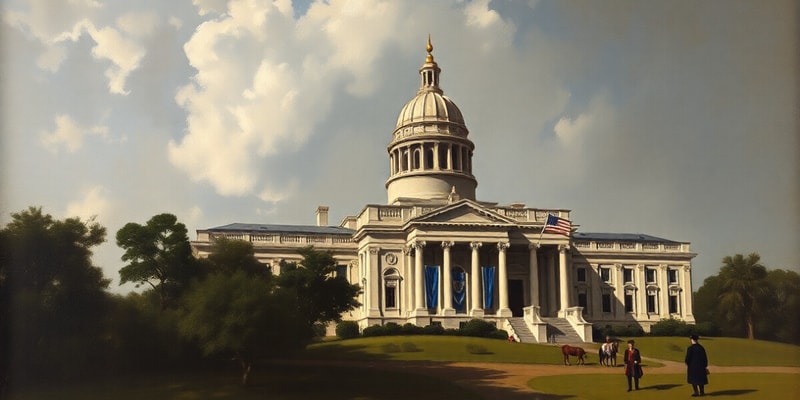Podcast
Questions and Answers
What is the supreme law of the United States?
What is the supreme law of the United States?
How many amendments does the U.S. Constitution currently have?
How many amendments does the U.S. Constitution currently have?
Which amendment abolished slavery?
Which amendment abolished slavery?
What rights are protected by the First Amendment?
What rights are protected by the First Amendment?
Signup and view all the answers
What does the Tenth Amendment state?
What does the Tenth Amendment state?
Signup and view all the answers
Which article of the Constitution defines the powers of Congress?
Which article of the Constitution defines the powers of Congress?
Signup and view all the answers
What is the significance of the Voting Rights Act of 1965?
What is the significance of the Voting Rights Act of 1965?
Signup and view all the answers
What is due process?
What is due process?
Signup and view all the answers
What is the role of the media in a democracy?
What is the role of the media in a democracy?
Signup and view all the answers
What does the Equal Protection Clause mandate?
What does the Equal Protection Clause mandate?
Signup and view all the answers
What is the purpose of the Electoral College?
What is the purpose of the Electoral College?
Signup and view all the answers
What is gerrymandering?
What is gerrymandering?
Signup and view all the answers
What is political socialization?
What is political socialization?
Signup and view all the answers
Who is tasked with implementing and administering public policies?
Who is tasked with implementing and administering public policies?
Signup and view all the answers
What principle prevents any one branch of government from becoming too powerful?
What principle prevents any one branch of government from becoming too powerful?
Signup and view all the answers
What is the 'bandwagon effect' in public opinion?
What is the 'bandwagon effect' in public opinion?
Signup and view all the answers
What is the federal bureaucracy?
What is the federal bureaucracy?
Signup and view all the answers
Who was the first President of the United States?
Who was the first President of the United States?
Signup and view all the answers
Study Notes
Foundations of the U.S. Government
- U.S. Constitution: Supreme law of the United States, outlining the structure and powers of the federal government, along with citizens' rights.
- Bill of Rights: The first ten amendments to the Constitution, guaranteeing fundamental rights such as freedom of speech, religion, and the press.
- Amendments: 27 amendments have been added to the Constitution since its ratification.
- 13th Amendment: Abolished slavery in the U.S.
- James Madison: Known as the "Father of the Constitution," he played a key role in drafting the document.
- Preamble: Introduces the Constitution, outlining its goals of forming a more perfect Union, establishing justice, ensuring domestic tranquility, providing for the common defense, promoting the general welfare, and securing the blessings of liberty.
-
Branches of Government:
- Legislative: Makes laws (Congress).
- Executive: Enforces laws (President and cabinet).
- Judicial: Interprets laws (Supreme Court and lower courts).
Key Constitutional Concepts
- Federalism: Power is divided between the national government and state governments.
- Separation of Powers: Power is divided among the three branches to prevent any single branch from becoming too powerful.
- Checks and Balances: Each branch of government has the ability to limit the power of the other branches.
- Supremacy Clause: Declares the Constitution and federal laws are supreme over state laws.
- Necessary and Proper Clause: Allows Congress to make laws necessary and proper for carrying out its enumerated powers.
- Civil Liberties: Individual rights and freedoms protected from government interference, enshrined in the Bill of Rights.
- Habeas Corpus: The right of a person to be brought before a court to determine the legality of their detention.
- Due Process: The legal requirement that the government must follow fair procedures and respect legal rights when dealing with individuals.
- Civil Rights: Rights to ensure equal treatment under the law for all citizens, including protection from discrimination based on race, color, religion, sex, or national origin.
Political Participation
- Public Opinion: The collective attitudes and beliefs of individuals regarding certain issues.
- Political Socializaton: The process by which individuals acquire their political beliefs and values.
- Voter Registration: The process of signing up to vote in elections.
-
Types of Elections:
- Primary Elections: Parties select their candidates for general elections.
- General Elections: Voters choose their representatives.
- Special Elections: Held to fill vacancies or address specific issues.
- Electoral College: A body of electors established by the Constitution, responsible for formally electing the President and Vice President.
- Gerrymandering: Manipulating electoral boundaries to favor a particular political party or group.
- Interest Groups: Organizations that advocate for policies to benefit their members' interests.
- Lobbying: The act of attempting to influence policymakers on behalf of interest groups.
U.S. History and Key Events
- Declaration of Independence: Declared the United States as a sovereign nation, highlighting the principles of liberty and self-government.
- American Revolution: The war of independence against British rule, fought between 1775-1783.
- Emancipation Proclamation: Issued by President Lincoln during the Civil War to free enslaved people in Confederate states.
- Civil Rights Act of 1964: Outlawed discrimination based on race, color, religion, sex, or national origin.
- Voting Rights Act of 1965: Prohibited racial discrimination in voting.
- Great Compromise: Agreement reached during the Constitutional Convention, establishing a bicameral legislature with representation by population (House of Representatives) and equal state representation (Senate).
Additional Key Concepts
- Judicial Review: The Supreme Court's power to review laws and determine if they are constitutional.
- Impeachment: The process by which a government official can be charged with a crime, leading to possible removal from office.
- Affirmative Action: Policies designed to redress past discrimination by promoting equal opportunities for historically disadvantaged groups.
- Rule of Law: The principle that everyone, including government officials, is subject to the law.
- Federal Bureaucracy: Large, complex organization of government officials and agencies responsible for implementing and administering public policies.
- Merit System: A system of hiring government employees based on ability and qualifications.
- Referendum: A direct vote by the public on a specific issue or policy.
Roles and Responsibilities
- Congress (Legislative Branch): Makes laws, approves budgets, declares war.
- President (Executive Branch): Enforces laws, commander-in-chief of the military, appoints judges.
- Supreme Court (Judicial Branch): Interprets laws, reviews legislation, resolves disputes between states.
Additional Facts
- First President: George Washington
- U.S. Representatives' Term: 2 years
- Presidential Term: 4 years
- Voting Age: 18 years old
- U.S. Economic System: Capitalist or market economy.
- Second Amendment: Guarantees the right to bear arms.
- Commander-in-Chief: President of the United States.
- President's Succession: Speaker of the House becomes President if the President and Vice President are unable to serve.
Studying That Suits You
Use AI to generate personalized quizzes and flashcards to suit your learning preferences.
Description
Explore the essential elements of the U.S. government, including the Constitution, Bill of Rights, and the various amendments. Understand the roles of key figures like James Madison and the three branches of government. Test your knowledge of the foundational documents and principles that define American democracy.




